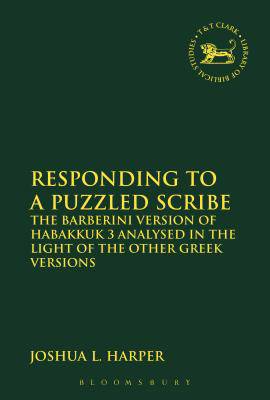
Je cadeautjes zeker op tijd in huis hebben voor de feestdagen? Kom langs in onze winkels en vind het perfecte geschenk!
- Afhalen na 1 uur in een winkel met voorraad
- Gratis thuislevering in België vanaf € 30
- Ruim aanbod met 7 miljoen producten
Je cadeautjes zeker op tijd in huis hebben voor de feestdagen? Kom langs in onze winkels en vind het perfecte geschenk!
- Afhalen na 1 uur in een winkel met voorraad
- Gratis thuislevering in België vanaf € 30
- Ruim aanbod met 7 miljoen producten
Zoeken
Responding to a Puzzled Scribe
The Barberini Version of Habakkuk 3 Analysed in the Light of the Other Greek Versions
Joshua L Harper
€ 88,45
+ 176 punten
Omschrijving
In part one of this book Joshua L. Harper is able to demonstrate the following aspects of the Barberini version: when compared with the other Greek versions, it appears that the Barberini version was originally independent of the Septuagint but has been influenced by it in transmission. The Barberini version was probably translated no earlier than the later books of the Septuagint (that is, around the first century BC), and no later than the mid-third century AD. The style, methods of translation, and exegetical affinities suggest that the translator was primarily concerned with producing stylistic, understandable Greek rather than with conforming closely to the Hebrew source text. The translator was probably Jewish, particularly since some readings resonate with Jewish exegetical traditions. The relatively polished Greek suggests that the translator had received some formal Greek education, perhaps in a Hellenistic Jewish community.
In the second part of this work Harper provides text, translation, and notes for the major Greek versions. The Barberini version has been analysed in particular detail, with regard to lexical and syntactical translation technique, as well as matters of style.
In the second part of this work Harper provides text, translation, and notes for the major Greek versions. The Barberini version has been analysed in particular detail, with regard to lexical and syntactical translation technique, as well as matters of style.
Specificaties
Betrokkenen
- Auteur(s):
- Uitgeverij:
Inhoud
- Aantal bladzijden:
- 336
- Taal:
- Engels
- Reeks:
- Reeksnummer:
- nr. 608
Eigenschappen
- Productcode (EAN):
- 9780567671950
- Verschijningsdatum:
- 25/08/2016
- Uitvoering:
- Paperback
- Formaat:
- Trade paperback (VS)
- Afmetingen:
- 156 mm x 234 mm
- Gewicht:
- 467 g

Alleen bij Standaard Boekhandel
+ 176 punten op je klantenkaart van Standaard Boekhandel
Beoordelingen
We publiceren alleen reviews die voldoen aan de voorwaarden voor reviews. Bekijk onze voorwaarden voor reviews.









